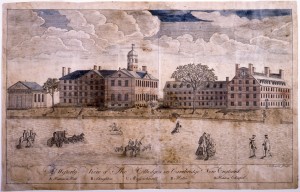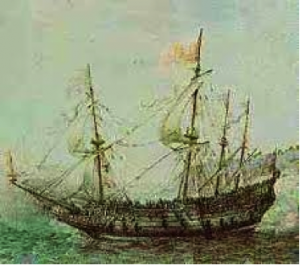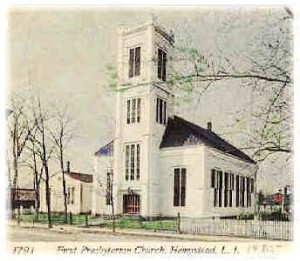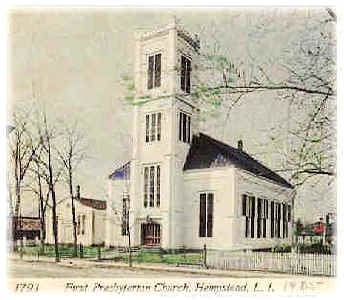In Hempstead, Long Island sits a church. This church does not boast in size nor exhibit extraordinary beauty. In fact, there may be no reason for anyone outside the congregation to acknowledge its existence. Well, there is at least one other person who would notice the church—that person is me. Even though I have never visited this church, I feel a special connection to it from almost one thousand miles and 360 years away. In 1644, my eleventh great grandfather, Reverend Richard  Denton, founded Christ’s First Presbyterian Church of Hempstead, the first Presbyterian church in the United States. By gathering information from a scholarly journal on the history of New York and various genealogy websites, I have successfully pieced together the story of how Rev. Denton introduced Presbyterianism to the New World.
Denton, founded Christ’s First Presbyterian Church of Hempstead, the first Presbyterian church in the United States. By gathering information from a scholarly journal on the history of New York and various genealogy websites, I have successfully pieced together the story of how Rev. Denton introduced Presbyterianism to the New World.
Rev. Denton graduated from Cambridge University, the “intellectual center of Puritanism,” in 1623 (Kerr 181). The photo to the left shows the five colleges of Cambridge around the time of Rev. Denton’s matriculation. Rev. Denton was greatly influenced during his time at Cambridge by Puritan thinkers who advocated a religious reform and a new process for choosing church leaders. They desired a representative form of government rather than the Divine Right of Kings. This preference carried over to the church government, in which they opposed the orders of the ministry. The principles of Reformed Religion became rooted in Rev. Denton, and he completely let go of the Church of England to pursue a life of Presbyterianism.
Seven years after graduating college, Rev. Denton left his church, took his family, and joined his neighbors in t he trek to New England, where he began his pioneering work. He traveled across the Atlantic Ocean on a ship named James, which is pictured to the right. He first settled in Watertown, Massachusetts in 1630, but he did not stay long. His rigid democracy created too much conflict with the Anglican Church in the area, so he moved to Wethersfield, Connecticut, then again to Stamford, and finally to Hempstead, Long Island. Long Island, at that time, was under control of the Dutch government. The director of the Dutch territory, Willem Kieft, granted Rev. Denton a patent allowing him to move there and to build a settlement. In Hempstead, Rev. Denton not only “laid well the foundation of representation in civil and religious affairs” but also laid the literal foundation for Christ’s First Presbyterian Church of Hempstead in 1644 (Kerr 186). The congregation was placed under Dutch rule and law but was allowed to practice Presbyterianism and to vote in New Netherland, the Dutch territory. Rev. Denton ensured that the Presbyterians’ relationship with the Dutch remained peaceful—since, after all, they were occupying Dutch territory. The picture below depicts the church almost 150 years after it was built.
he trek to New England, where he began his pioneering work. He traveled across the Atlantic Ocean on a ship named James, which is pictured to the right. He first settled in Watertown, Massachusetts in 1630, but he did not stay long. His rigid democracy created too much conflict with the Anglican Church in the area, so he moved to Wethersfield, Connecticut, then again to Stamford, and finally to Hempstead, Long Island. Long Island, at that time, was under control of the Dutch government. The director of the Dutch territory, Willem Kieft, granted Rev. Denton a patent allowing him to move there and to build a settlement. In Hempstead, Rev. Denton not only “laid well the foundation of representation in civil and religious affairs” but also laid the literal foundation for Christ’s First Presbyterian Church of Hempstead in 1644 (Kerr 186). The congregation was placed under Dutch rule and law but was allowed to practice Presbyterianism and to vote in New Netherland, the Dutch territory. Rev. Denton ensured that the Presbyterians’ relationship with the Dutch remained peaceful—since, after all, they were occupying Dutch territory. The picture below depicts the church almost 150 years after it was built.
Rev. Denton served as minister in Hempstead for fifteen years and saw his Presbyterian beliefs of representative government in both church and community flourish. In 1659, Rev. Denton returned to England to settle family matters and died there in 1662. Cotton Mather, a well-known preacher and author, commented on Rev. Denton in his “Magnalia Christi” mem oir: “Though he were a little man, yet he had a great soul; his well-accomplished mind, in his lesser body, was as an Iliad in a nutshell. I think he was blind of an eye, yet he was not the least among the seers of Israel; he saw a very considerable portion of those things which eye hath not seen. He was far from cloudy in his conceptions and principles of divinity.” Rev. Denton’s innumerable contributions to the settlement of Hempstead and passion for his teachings forever changed the course of Reformed Religion in the New World.
oir: “Though he were a little man, yet he had a great soul; his well-accomplished mind, in his lesser body, was as an Iliad in a nutshell. I think he was blind of an eye, yet he was not the least among the seers of Israel; he saw a very considerable portion of those things which eye hath not seen. He was far from cloudy in his conceptions and principles of divinity.” Rev. Denton’s innumerable contributions to the settlement of Hempstead and passion for his teachings forever changed the course of Reformed Religion in the New World.
I feel a strong connection to Rev. Denton. Although I attend a Baptist church, I know that Baptists and Presbyterians share a number of core Christian beliefs. My connection to Rev. Denton is much greater than the connection one typically shares with her long deceased ancestors. I feel like I have a spiritual connection with Rev. Denton, and I am proud that he played such a prominent role in bringing the messages of democracy and Christianity to the New World.
Works Consulted
Kerr, Frank Melville. “The Reverend Richard Denton and the Coming of the Presbyterians.” New York History. 21.2 (1940): 180-186. Web.
